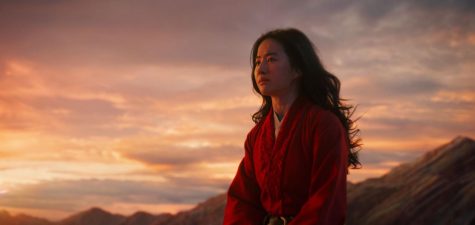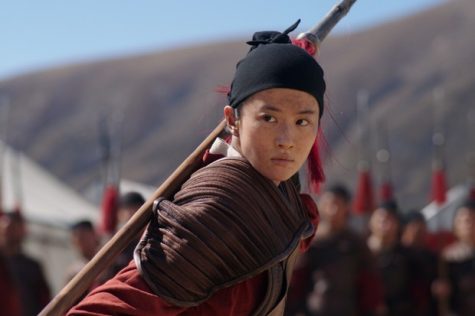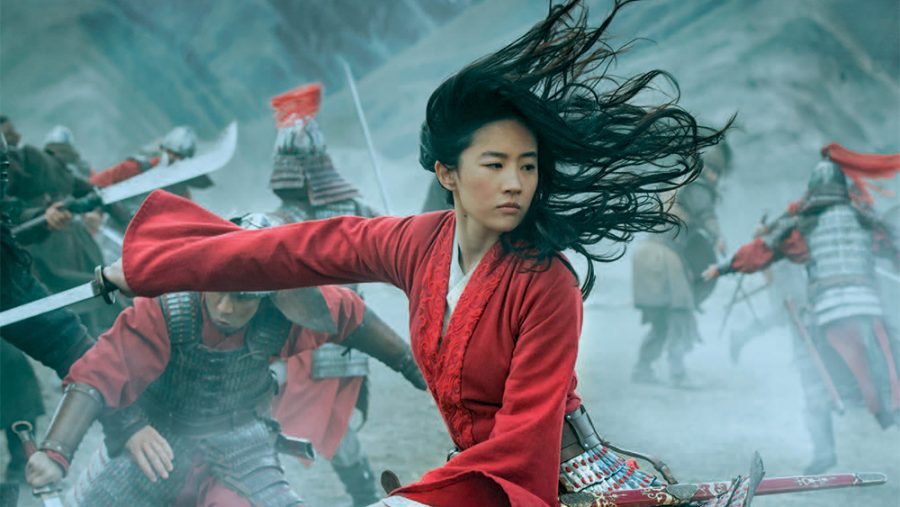Review: Mulan looks far beyond her reflection
The live action adaptation of the 1998 classic blossoms in adversity to its predecessor
Photo Variety
Promotional picture for the latest remake of beloved Disney classic, Mulan, starring Liu Yifei.
September 11, 2020
Disney’s series of live-action remakes of their classic movies have always been pretty hit or miss, mostly because they always have their own spin on the original story. The most recent in this remake series is Mulan (2020), which was originally supposed to hit theatres March 27 earlier this year but was pushed back when COVID-19 started to become more widespread. It dropped on Disney+ September 5 with a $29.99 fee. Just from seeing the trailer, I could tell this adaptation would be quite different from the original, a lot more serious and more action, given that the film is rated PG-13.
Watching it was a lot to take in. When sources from Disney said they wanted the film to be more “culturally authentic,” I was concerned to hear they hired not only a white director but also a white casting director, white composer, white costume designer, white screenwriters, and white cinematographer. While the set and costumes were beautiful, the interactions between the characters felt rather stereotypical. I may not be able to speak for how well Chinese culture was portrayed, but I wouldn’t be surprised if the movie was another victim of Disney’s whitewashing.

One of the best parts of having live-action remakes is seeing the 2-D animated world from my childhood come alive. There was so much to take in from just the surroundings that I had to rewatch some scenes a couple of times (which is a lot easier when the movie’s being streamed in my own home and not a theatre). The landscapes were so large that even the soldiers marching ahead looked small in comparison. The places the crew chose to film the movie really took my breath away and they just made the scenes so incredibly grand.
The most memorable thing about the original movie was the iconic music, and I was actually content with the absence of those songs since they wouldn’t have fit the more action-packed journey. I also wouldn’t be able to handle anyone else singing “I’ll Make a Man Out of You” or “Reflection” and those songs should stay as a nostalgic memory.
Throughout some scenes in the movie, you can hear the instrumentals of the original soundtrack. Music is among the most important aspects of any movie and the timing of when each song played was perfect. I found it interesting when there were scenes without any music or dialogue but rather only silence and the sounds of nature. It felt so intimate and lets you really take in every surrounding without distraction.

Growing up Asian, I always looked up to Mulan, not only because she was an Asian Disney Princess, but also because of her courage, strength, and wisdom.
My biggest fear for the movie was on how they were going to portray such a lovable character. The film, while staying loyal to her imperfections, really took her character and developed it, something that’s rarely seen with the franchise’s protagonist. Mulan’s no perfect saint, not only lying to her family and the Imperial Army but risking her family’s honor.
Of course, she has good intentions, but the 2020 film really showed the guilt and humility Mulan had to face before finding balance within herself and her priorities. There’s a scene toward the end of the movie that parallels the first scene in Mulan and it highlights her personal growth after balancing her chi. The character is an amazing role model for young girls, battling not only the enemies of Imperial City but also her own truths. The emotions Liu Yifei (the lead actress playing Mulan) portrayed seemed so raw and really blossomed Mulan’s character.
A huge problem for some fans when more information spread about Mulan was the removal of fan-favorite characters, Mushu and Li Shang. With the movie taking a more serious route, I understand the removal of Mushu. There’s no room for a sassy dragon guardian amidst a war.
But then there’s Li Shang, Mulan’s commanding officer and love-interest. “I think particularly in the time of the #MeToo movement, having a commanding officer that is also the sexual love interest was very uncomfortable and we didn’t think it was appropriate.” said producer Jason Reed. I think that’s fair. After all, if we want to have a strong, independent girl on the big screen, she doesn’t need a male savior. This also paved room for new characters, each of which caught me off guard with the amount of depth they have.
Instead of Li Shang, the character was split into two roles, Commander Tung (Donnie Yen) and Chen Honghui (Yoson An), each taking different aspects of the original character. Commander Tung, Mulan’s commanding officer, took the wise mentor role, aiding Mulan in her own self-reflection. There’s a scene in some of the film’s promos of Yen doing an intricate sword display. It’s so captivating and there’s a narration paired with it, strengthening the film’s repetitive message: Loyal, brave, true. The casting for this character was perfect.
On the other hand, Honghui is by far the worst and most unnecessary role in this film. Mulan’s main focus in this movie is serving in the Imperial Army and finding herself. The sudden introduction of a potential love interest was uncalled for and out of the blue. His contribution to Mulan’s story arc could’ve been done by anyone of her peers. He’s so replaceable that any hot-Asian male could’ve been cast for the role and it wouldn’t have made a difference.
A completely new character introduced in the film was Xian Lang (Gong Li), who takes the place of Bori Khan’s hawk. She’s a powerful witch with shapeshifting abilities who’s been cast away from society. Lang is an example of how women were treated when demonstrating strong and powerful abilities and her story is very similar to that of Mulan’s. She’s essential to Mulan’s own self-reflection and the sight of two strong women on-screen made a great statement on feminism and would’ve resonated with me a lot more if they hadn’t introduced that useless Honghui character.
Mulan’s father, Fa Zhou was never talked about as much when people watched the original movie, despite his importance in it. Tzi Ma was cast to play this role and he really brings out Mulan’s close relationship with her father. I’ve already seen Ma in The Farewell (2019), where he coincidentally plays the protagonist’s father. Fa Zhou is one of the most important characters in Mulan’s arc and seeing their father-daughter relationship grow from the beginning hits close to home for me and a lot of Asian families.
Mulan is grand and astonishing on its own. The choice to lean so far from its predecessor was bold and risky, but I believe that’s what made it so great. No one wants to see a film attempt to remake its original scene by scene and then be disappointed when it doesn’t meet the expectations. Mulan is an adaptation of the original, not a reflection. While it would’ve been nice for more of the crew to be Asian, seeing the Asian dominant cast for the film is incredible and hopefully is the beginning of many more Disney films to properly cast (and hire) BIPOC.











